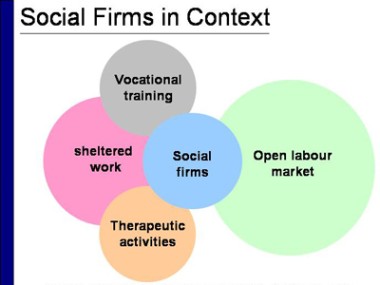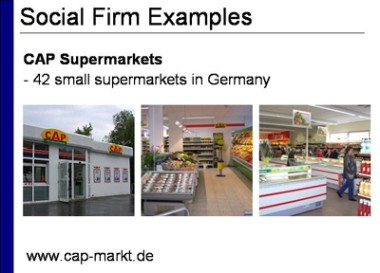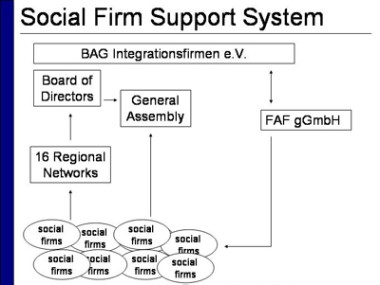Social Firms in Each Country
Social Firms in GermanyCreating meaningful
employment for people with disabilities
Tokyo - January 2007 Gerold Schwarz
Agenda
- Definition and values
- Social Firms in the context of vocational integration
- Brief historical background and data
- Characteristics and Impact
- Lessons learned - success factors
- Recent developments and outlook
What is a social firm?
- A Social Firm is a business created for the employment of people who have a disability or are otherwise disadvantaged in the labour market.
- It is a business which uses its market-orientated production of goods and services to pursue its social mission.
- A significant number of its employees will be people with a disability or other disadvantage in the labour market.
- Every worker is paid a market-rate wage or salary, appropriate to the work.
- Work opportunities should be equal between disadvantaged and non-disadvantaged employees.
- All employees should have the same employment rights and obligations.
Definition of a Social Firm from CEFEC, Confederation of European Firms, Employment Initiatives and Co-operatives, 1997
Social Firm common values
Enterprise
Social Firms are businesses that combine a market orientation and a social mission - 'businesses that support' rather than 'projects that trade'
Employment
The working environment is one that provides all employees with support, opportunity and meaningful work.
Empowerment
Social Firms are committed to the social and economic integration of disabled people through employment. A key means to this end is economic empowerment through the payment of market wages to all employees.

Social Firm Milestones
- Late 1970ies first “self-help” firms in Germany
- National Social Firm Association established in 1985
- Over 100 social firms in 1985
- Government and EU funded programmes to develop social firms
- Several surveys funded by National and Regional Government
- Law on Social Firms in 2000
- After 2000 growing interest from all political parties - social firm“wave”
- Professionalisation of social firms and support - from niche markets - to mainstream businesses
- Increasing partnerships with private sector and sheltered workshops
Social Firm Current Numbers
- 710 social firms in Germany (March 2006*)
- Approx. 25,000 jobs in social firms:13,000 jobs for people with disabilities12,000 jobs for other people
- On average 40 employees per social firm
- On average 0.5 Mio EUR annual turnover/ social firm
* BAG Integrationsfirmen - internal survey 03/2006



Government Support
General Principle:
Compensation of Disadvantages and Support for Investment - no general subsidies or funding that affects competitive advantage
- Grants/ Loans for Investment:
25,000 EUR per workplace - Financial support for salaries for people with disabilities:
40% - up to 3 years - Compensation for lower productivity of people with disabilities:
10 - 30% 2 years, renewable - Business Consultancy:
4,500 EUR for start-up, 2,000EUR existing social firm - Indirect Support:
Non-profit status = lower VAT, no tax on profit (profit must only used for charitable means)

Support Systems
BAG Integrationsfirmen
- National Association of social firms in Germany
- Over 700 members
- Lobby work and awareness raising
- Conferences and networking
FAF gGmbH
100% owned by BAG IF - 4 offices
Business support services for social firms:
- Business Consultancy - focus on feasibility and viability
- Intelligent business concepts-combination of market intelligence, best practice in business and focus on employment creation
- Specialised training for social firm managers
- Research and Evaluation
- Development, Management and Co-ordination of support - and social firm development projects
Examples of FAF’s Work-Economic Analysis of Social Firms:
- Analysis of cost and benefits of social firms
- Up to 150% of public funding flows back to Government through taxes and social security contributions
- On average 70% of cost earned on the market
FAF is the main partner for Government for social firm intelligence and development
Social Firms Impact
- Social firms have helped people with serious disabilities to fully participate as economically independent members of society
- Social firms turn people with disabilities into tax-paying members of society
- In the long run social firms procure their own income on the open market and can reach a high level of independence from public funding
Lessons learned - Success Factors
Individual level:
- Abilities and creative potential of people with disabilities - training and development
Business level:
- Strong focus on value, product and market - critical mass and co-operation
External factors:
- Professional support,networking and compensation of disadvantages
Recent Developments and Outlook
- Moving up in the value chain - i.e. in company Services
- Outsourcing partnerships with private enterprises (i.e. bicycles for VW)
- Purchase of companies
- Joint-venture with private companies
- “In-sourcing” of services - social established by charities to provide services to mother organisation
- Replication, Franchising, Licensing
- Growing interest from Sheltered Workshops “Deutzer Erklaerung”
- New Government Initiatives: i.e. 4000/1000 jobs for people with disabilities - however, decreasing income from quota system
- Further international exchange and co-operation
Further Information
www.bag-integrationsfirmen.de
www.faf-gmbh.de
Gerold Schwarz
gerold.schwarz@gmail.com
